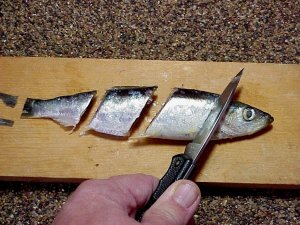31 May 2020
When many people tell someone to fish or cut bait, they mean that the person should either get the job done or quit. They assume that cutting bait refers to cutting the fishing line and abandoning the bait to the waters. But that is not what the metaphor underlying the phrase means. To cut bait is to prepare the bait, specifically to chop it up into pieces, an unpleasant, but necessary, job. So, the underlying metaphor of the phrase means to take either a lead or a secondary role, but in either case, get to work. The misunderstanding undoubtedly arose because people who had never been fishing began using the phrase.
A literal use of fish or cut bait appears in the New York Daily Tribune of 8 August 1844, in an article that makes the point that the fishermen and hunters out in Suffolk County on Long Island are every bit as good as sophisticated Manhattanites:
Our friends who look down to Fire Island and about assure us that cleverer fellows to fish or cut bait, bag game or even shoot it (when you want the reputation of a sportsman and have to do it on borrowed capital) can’t be found any where.
And the earliest figurative uses of the phrase give three alternative actions, not just two: fish, cut bait, or go ashore, making it akin to phrase I learned in the Army: lead, follow, or get out of the way. This three-pronged phrase appears in the Detroit Free Press of 10 June 1848 in the context of Zachary Taylor receiving the Whig party’s nomination for president. The abolitionist wing of that party was upset that Taylor, a slave owner, got the party’s nod:
Here we have been for the last six months abusing the war—the officers, and soldiers and above all manifesting our sympathy for the slaves and just as we had got ready to hurrah! over goes our dish by the nomination of one of the greatest slave holders in christendom. ‘Othelo’s occupation is gone’ and we have either got to “cut bait, fish or go ashore.”
Over the next few years, the abolitionists among the Whigs would end up “going ashore” and joining the newly formed Republican party.
Republican Abraham Lincoln was elected president in 1860, igniting the U.S. Civil War. And he is reported by multiple sources to have used the three-pronged phrase in July 1862 in a meeting with congressmen from the so-called Border States, those slave states that had remained in the Union. The Independent of 17 July 1862 reports on it thusly:
The President on Saturday last invited the Border-state congressmen to a conference, in which he endeavored to induce them to adopt his policy of gradual emancipation. [...] Mr. Lincoln is said to have told the Border-state men that “they must either fish, cut bait, or go ashore!”
The same Lincoln story and quote is relayed by the Pittsburgh Gazette on 21 July 1862 and is reported in Britain by The Scotsman of 29 July 1862.
The shortened, two-prong version of the phrase is in place a few years later. From the Pittsburgh Daily Post of 15 August 1866:
The Washington correspondent of the radically pious and piously radical sheet, the New York Independent, is determined to make Stanton fish, or cut bait. In speaking of the New Orleans riot he says: “Mr. Stanton, who was so bold during the war, is trembling with fear and remorse in the shadow of his office.”
And the New York Times of 11 July 1868 has nice use and explanation of the metaphor:
The Committee had done the bidding of Tammany Hall long enough, and it was time they had a mind of their own. Ex-Councilman MERRITT was in favor of indorsing the nomination: they must either fish or cut bait, and as they were not large enough to fish they must be content to cut bait for Tammany.
This history does not, however, necessarily mean that people today are using the phrase incorrectly. Usage, not etymology, governs what a word or phrase means. If people use and understand fish or cut bait to mean do the job or get out of the way, then that is what the phrase means. But such a usage is not what the phrase originally meant.
Sources:
“America.” The Scotsman, 29 July 1862, 4. ProQuest Historical Newspapers.
“American Nero.” Daily Post (Pittsburgh), 15 August 1866, 2. ProQuest.
“CONGRESS: Debate on the Bill to Call Out Militia.” The Independent, 17 July 1862, 8. ProQuest.
“Constitutional Union General Committee.” New York Times, 11 July 1868, 8. ProQuest Historical Newspapers.
Green’s Dictionary of Slang, 2020, s.v. fish v.1.
“Notes from the Capital.” Pittsburgh Gazette, 21 July 1862, 3. ProQuest.
“Thanks.” Detroit Free Press, 10 June 1848, 2. ProQuest.
“A Voice from Old Suffolk!” New York Daily Tribune, 8 August 1844, 2. ProQuest.
Photo credit: Lake Michigan Angler, 2009,

